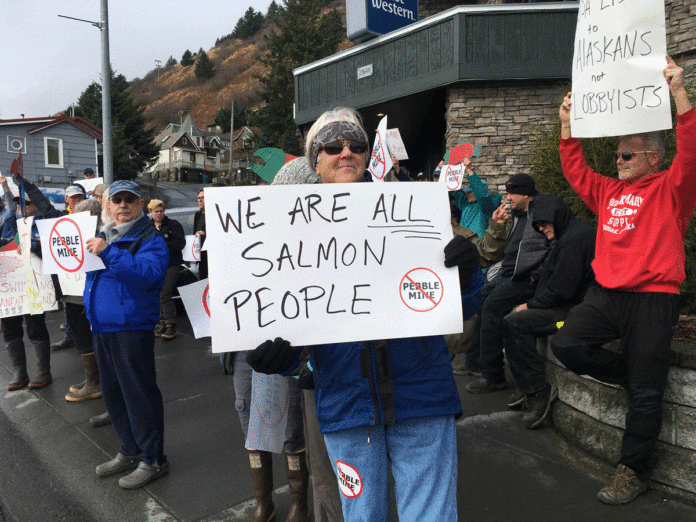
Concerns over the draft environmental impact statement for the proposed Pebble mine and the May 30 deadline for public comment on the document are mounting, as public hearings proceed in communities in the Bristol Bay region
The U.S. Army Corps of Engineers, which is conducting the hearings, has not yet decided whether to extend that deadline beyond its current 90-day limit. Meanwhile community and tribal leaders from Southwest Alaska, joined by a prominent University of Washington salmon researcher and a climate change specialist have testified before the Alaska House Resources Committee about their concerns of the impact of the proposed mine, and a protest march was held in Kodiak during ComFish Alaska 2019 on March 29.
“Alaskans should be dismayed,” said fisheries research professor Daniel Schindler, of the UW School of Aquatic and Fisheries Sciences, told legislators on April 3 in Juneau. “Alaska’s leaders should be outraged. The Army Corps of Engineers should be ashamed of themselves and embarrassed if they are going to put this environmental impact statement forward as a piece of credible science. It is not. The EIS is a bit of a farce. I hate to use that term, but it does not have scientific credibility and it distinctly underestimates risks.”
“There are several alternatives as to how this proposed mine might establish a transportation corridor…the primary transportation and the alternative corridors would impact or cross native-owned lands,” said Jason Metrokin, president and chief executive officer of Bristol Bay Native Corp. “There would need to be a right of way given by those land-owners. BBNC is opposed to this project and we would not grant the use or the impact to our native sub-surface lands.” When questioned, Metrokin affirmed both Pebble and the USACE have been told that land access will not be granted.
“People of Bristol Bay are insulted by this process,” said Gayla Hoseth, second chief of the Curyung Tribal Council in Dillingham, in her testimony to the committee. “The EIS document is fundamental to this process and what the Army Corps of Engineers has produced is so inadequate it is a slap in the face to us and is supposed to be the foundation of the whole thing.”













